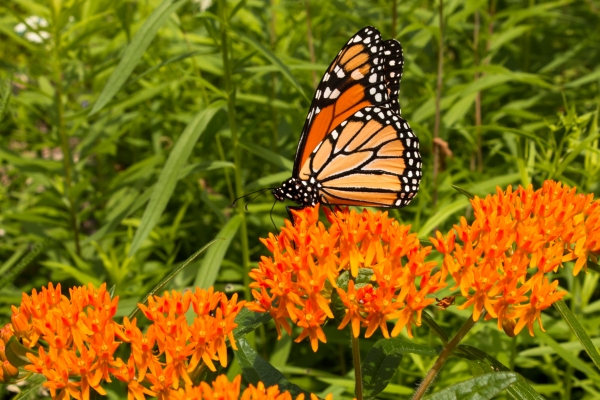Pollinators--another way to spread the Good News

By the Rev. Dr. Maria Evans
Interim Rector at Trinity Episcopal Church, Hannibal
and member of the Diocesan Creation Care Ministry
What do climatologists, entomologists, and lepidopterists have in common these days? (And feel free to google all those "ists" if I've thrown a new one your way.)
Well...they are all trying to make sense of a positive phenomenon that happened this past fall. After years of declining populations of migrating Western Monarchs, we had a banner year for monarch butterflies in 2021. Although no one reason has been pegged as the cause of this spike, scientists have speculated that a "perfect storm" of three events each contributed to the population increase:
1. The pandemic and supply chain shortages resulted in fewer acres of arable land being farmed in 2020 and 2021.
2. The areas along their flight path had a drier than normal summer, and dry summers tend to be beneficial to monarch populations.
3. Each year continues to see a rise in "urban milkweed" as more and more people are planting milkweed in their flower beds and waste areas to attract butterflies.
We're not in much of a position to influence those first two reasons, but the third one is something we CAN continue to bolster.
When you plant milkweed and other pollinator-friendly native plants, you are not only helping monarch butterflies make a comeback, you are aiding bees, butterflies, and insects to thrive, and it's low impact. Perennial beds need very little care, and with a little proper selection of ground cover plants, you can create an environment that attracts not only butterflies, but bees, other insects, garden spiders, and the birds that nibble on them, such as purple martins. None of us can single-handedly replace the millions of acres of farmland devoid of milkweed and pollinator-friendly plants, but many of us working together can turn the tide in a different direction, as was seen this past winter.
Milkweed seeds are available both commercially and in the wild. The best way, of course, is to pick a few milkweed pods from a local plant in the fall and save them over the winter. About a month before you intend to plant them (generally after the danger of frost is over is best), place the seeds on a damp paper towel and put the towel in a jar. Leave the lid slightly loose. Place them in the refrigerator for 2-4 weeks; then remove and plant. Commercial seeds are usually already cold-stratified, so they can be planted right out of the package.
Planting milkweed is only one of the many small acts of kindness we can do to help preserve the delicate balance of "this fragile Earth, our island home." Once your pollinator space is up and going, it's a great spot to pull up a chair when saying Morning Prayer or reading a devotional over the morning coffee. Please consider planting milkweed or other pollinator-friendly plants this spring as an act of devotion in caring for some of God's smallest and most delicate creatures.
Tags: News / Creation Care
 Priest-in-Charge, Trinity Episcopal Church, St. James and Diocesan Creation Care Missioner
Priest-in-Charge, Trinity Episcopal Church, St. James and Diocesan Creation Care Missioner